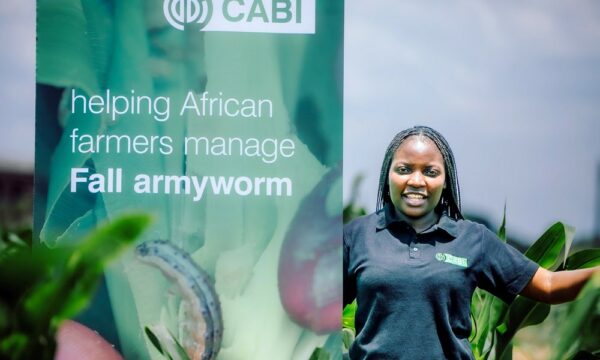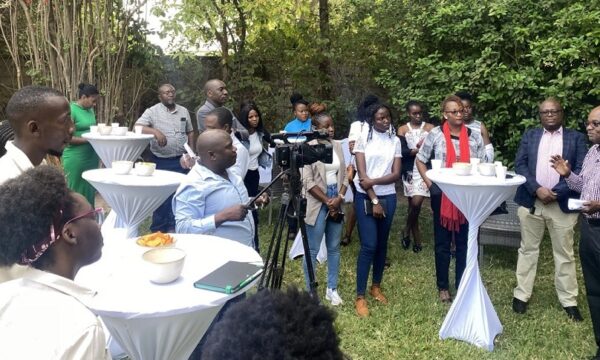
CABI has been busy facilitating a participatory video training to help Zambian women at the forefront of the fight against the devastating fall armyworm (Spodoptera frugiperda) better get to grips with the pest that threatens their livelihoods and food security.
As part of the project ‘Village-based biological control of fall armyworm in Zambia,’ funded by the Australian Centre for International Agricultural Research (ACIAR), CABI engaged with 17 women from two camps in Chirundu district (Southern Province), namely Kapululira and Gota Gota.
The innovative approach – which uses participatory video as a tool to bring people together to explore issues and voice their concerns through simple games and exercises – ultimately aims to support women to use low-risk biological control options for fall armyworm on maize.

Biological control options for the fall armyworm
CABI is trialling use of two biological control options for fall armyworm in Zambia. Results from a gender study conducted last year in four districts in Zambia (Chirundu, Chongwe, Mumbwa, and Siavonga) highlighted women’s extensive role in maize production and pest management.
Kate Constantine, Project Scientist and lead researcher, said, “Women’s access to resources is more constrained than men’s frequently resulting in women, especially women household heads, relying on hand-picking and cultural methods to manage fall armyworm including application of ash, neem, and sand, rather than chemical pesticides which were used more frequently by men.
“Importantly, there were high levels of interest in biological control as another tool in the fight against fall armyworm.”
Videos to communicate their needs

She said that the participatory video approach enabled the women participants to learn storyboarding, filming, editing and screening – through reflection and discussion – before they then show their video to communicate their needs to other groups or communities and to decision-makers.
Ms Constantine added, “This raises awareness and helps the women share their knowledge as well as promote advocacy, evaluation, consultation and action research on how they are empowered to use sustainable methods for pest management.
“We used ‘problem trees’ to identify significant issues the women encounter within farming, outlining their perceptions of the causes (roots) and outcomes (branches) of these problems. Progressing on to exploring potential solutions, and collectively identifying ways each problem could be addressed.
“The key problems identified by the women included lack of irrigation equipment, issues around lack of early maturing varieties, lack of crop diversification, crop pests, expensive farm inputs, market access / prices and market flooding, wildlife, and lack of opportunities for women’s empowerment.”

Biological control as an alternative pest management option
The participants visited the Village based biocontrol of FAW in rural Zambia field trial plot in Gota Gota camp to learn more about biological control as an alternative pest management option.
Léna Durocher-Granger, Project Scientist – Entomologist, and ACIAR Project Manager based at CABI’s centre in Lusaka, said, “This was an excellent opportunity for these women to see biocontrol in action and learn about the benefits of this approach for FAW management.”
As a response to expensive inputs, the women requested training on tea manure, following this request, two youth farmers from Siavonga (a neighbouring district) visited Kapululira to demonstrate how to make ‘tea manure’ as fertiliser, the women were interested in the practice and the demonstration was followed by many questions.

The women also chose to interview a village headman who was asked about ways in which the community supports women. The participants captured copious footage documenting their challenges and potential ‘community-owned’ solutions, going on to learn how to log their footage and being shown how to use editing software.

Showcase their learning and screen their final video
The course culminated in a ‘community screening’ event, where the women invited their families and friends as well as respective community leaders including village headmen to showcase their learning and screen their final video.

Following the screening a lively discussion ensued around the issues covered in the video. The women were clearly very proud of their hard work and the final video they had produced. They reported that they had enjoyed the training process and learning a new skill as well as developing their knowledge on biocontrol.
The women said that gaining knowledge and skills encourages women’s empowerment and that working together and supporting each other is very important. It was inspiring to see the women turn up each day despite their busy schedules, enthusiastic and ready to learn.
“The participatory video process facilitated exploration of the challenges these women face on a day-to-day basis, which they were then able to present in their own words, enabling them to become the researchers in their own story, and highlights the value of such participatory approaches,” said Ms Constantine.
Nomsa Tembo and Muyabango Liywalii, from CABI’s Lusaka centre, adeptly supported the participatory video training developing their own skillset in the process.
This work was funded by a Doctoral School Research Award from Royal Holloway University of London contributing towards a PhD being conducted by Kate Constantine, and ACIAR, under the project ‘Village-based biocontrol of fall armyworm in rural Zambia.’
Additional information
Main image: A participatory video approach is empowering women in Zambia to voice their concerns about management of the fall armyworm pest (Credit: CABI).
Project page
Find out more about how CABI is helping Zambian smallholder farmers sustainably tackle the fall armyworm from the project page ‘Village-based biological control of fall armyworm in Zambia.’
Relevant story
‘Project advocates village-based biological control of fall armyworm in Zambia.’
For more information on community engagement through participatory video see Cobra Collective and Insight Share.
Related News & Blogs
CABI hosts panel to discuss youth engagement for biological control of fall armyworm in Zambia
CABI in partnership with the University of Zambia and the Zambia Agricultural Research Institute (ZARI) have hosted a panel to discuss engaging youth for the sustainable biological control of the devastating fall armyworm pest in Zambia. In recent year…
12 February 2025




